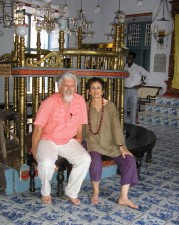The rocking horse
I vividly remember my first plane trip. We were seated in the second or third row, my mother, my younger brother and me. It must have been sometime during 1957 when travelling by jet plane was still a novelty. We were going to Adelaide to visit my mother’s sister and her family. I was nearly three and my brother was almost 18 months’ old.
My mother later described it as “the holiday from hell” – for me, not for anyone else. What she didn’t know was that the excitement associated with this big adventure started to evaporate on the plane itself.
Mid way through the flight the pilot emerged from the cockpit to stroll authoritatively down the aisle. His eyes alighted on my brother, with his mop of curly blond curls and bright blue eyes. “Hello, young man,” he said, “would you like to see how we fly this big bird?” Within seconds my brother had been scooped up and whisked into the cockpit. I remained invisible to the captain, even though I was sitting in the aisle seat and had presumably also looked up at his big masculine face with equally bright blue eyes. But I was a girl and this was technical, engineering, male-only business; dials and flashing lights and levers and control panels. The irony was that my brother was way too young to really grasp what was happening yet I was brimming with curiosity. He came out of the cockpit in tears.
I have few clear memories of my childhood but this happens to be one of them. And I can recall the feeling state as if it were yesterday.

Happier times: Michael & Annie Talvé in the Paresi Synagogue, Cochin, India 2006
I felt invisible. It wasn’t just envy that my brother got to experience something special, although I suppose there was a trace of that, it was an incomprehension about what had just happened. Why him and not me, why not both of us? What had I done wrong? That sense of having “done something wrong” of being somehow “wrong” has plagued me throughout my life. No matter how sophisticated my feminist reading of the situation might be, there is still a feeling component that defies intellectual analysis.
Once we arrived in Adelaide and settled into my Aunt’s home in the northern suburbs, the holiday took another sour turn. I had not met my two cousins before. A mirror image of my own family at the time, my Aunt had married a “displaced person” from post war Europe and had two children, a girl a few years older than me and a boy, exactly my age. For some reason my male cousin took an instant dislike to me and proceeded to torment and tyrannise me for the entire week we were there. I don’t have any conscious memories of this but my mother still speaks of it with incredulity. She couldn’t work out why he behaved in the way he did. He refused to let me play with his toys. I was forbidden to use his rocking horse. He screamed at me for no reason and finally hit me over the head with a ceramic cup. I guess it was jealousy or sibling rivalry and maybe my brother would have copped it too had he been a bit older.
Like all my three siblings (two more brothers came on the scene later), I was by all accounts a cooperative, optimistic and independent child. My life up until then had been harmonious. I was linguistically precocious, curious about the world and easy to get along with. Heading back to Sydney after our “holiday”, we broke the journey at my grandparent’s place in Henty, a small close-nit town in the Riverina district of NSW. My grandmother was shocked by my appearance. I had lost weight, looked drawn and pale and had retreated into myself.
Turning point
Looking back now I can see that the torturous week I spent in Adelaide as a young child was a turning point. My mother describes how she was taken out at one point by a family friend to see the city sights and I stayed glued to a seat by a bay window for the whole time she was away, quietly refusing to move until I saw her return.
Early one morning towards the end of our stay, the house still and slumber quiet, my mother and aunt were roused from their sleep by a rhythmic squeaking sound. When they got up to investigate they found me in the living room in the pitch dark on the forbidden rocking horse.
Somewhere in my two year old brain, I had worked out that the only way I was going to experience the unknown sensation of that rocking horse was to come up with an original plan.
Reflecting back on that time and over my life in general, I can see that every time I’ve faced a ‘rocking horse’ dilemma, obstacle or public failure of some kind, I’ve tackled it with the same quiet determination. Going in and out of shame, self doubt, fear and confusion has still been part of the psychological mix; but running alongside this has been a constant strain of sisu.


